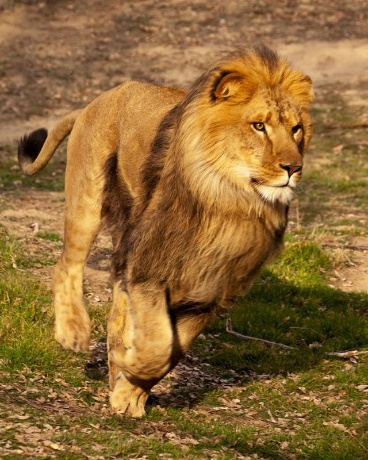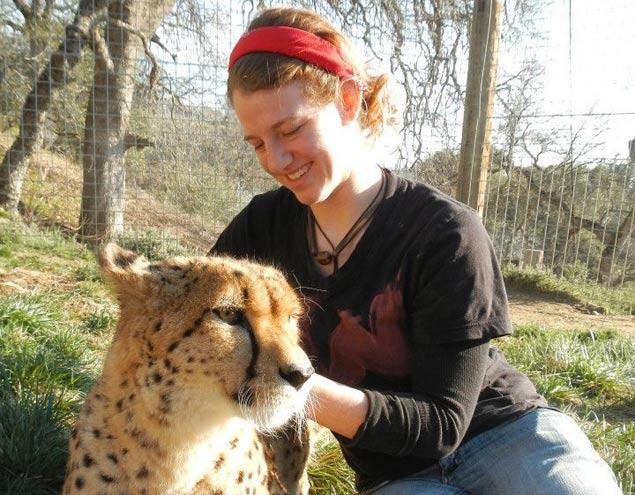Male lion kills intern at big cat sanctuary

An African lion killed 24-year-old intern Dianna Hanson in an attack on Wednesday, Mar. 6 at Project Survival's Cat Haven located in Dunlap, California. According to CNN, Dr. David Hadden, Fresno County coroner, says that Hanson died instantly of a broken neck and other neck-related injuries.
The 550-pound male lion apparently swiped Hansen with his paw. Investigators believe the lion escaped his cage by using his paw to lift a partially closed door. Hadden says that Hanson did not suffer, and other injuries were inflicted post-mortem.
Dianna Hanson was a life-long lover of big cats.
While studying ecology, evolution and biology at Western Washington University, she helped take care of four big cats owned by a family there. Her father reports that she had loved big cats from a very young age when she insisted that she someday wanted to work with Siberian snow tigers.
She had earned the six-month internship at Cat Haven, which she hoped would help her land a full time job at a zoo. Hanson's father reports that she felt the Cat Haven was safe, well-managed, and organized. She was just two months into her six-month internship when she died.
Dianna Hanson's father, Paul Hanson, says he was told his daughter wasn't mauled. The family finds it comforting in the face of this tragedy to know that Dianna died doing what she loved. It had been her life's dream to work with big cats. He noted that Couscous was one of her favorites at the animal park.
Dianna Hanson's Facebook page has many pictures of her petting tigers and other big cats. She expressed her disappointment to her father over the fact that the Cat Haven did not allow direct contact with the cats.

Investigators are looking into policies and practices at Cat Haven.
Cat Haven is a 100-acre private zoo near Fresno that breeds and keeps big cats like lions, jaguars and tigers. The zoo's owner said Thursday that he wouldn't discuss safety protocols because they are a part of the law enforcement investigation into Hanson's death. Dale Anderson, founder of the facility, says that Cat Haven has been "incident-free" since its opening in 1998.
Cal-OSHA is investigating the incident to determine if Hanson was performing a function that placed her in danger. They also want to determine if employees were properly instructed on the potential dangers of their jobs. The U.S. Department of Agriculture is also looking into the incident to assess whether Couscous was acting in an unusual manner that the staff should have been aware of. Cat Haven does not hold voluntary accreditation with the Association of Zoos & Aquariums nor the Global Federation of Animal Sanctuaries.
It is unclear why Hanson was in the cage alone at the time she was killed. Some reports state that she was cleaning a larger enclosure while the lion was caged off into a smaller area. The incident occurred around 12:30 p.m. Sheriff's deputies arrived on the scene within half an hour. Fresno County Sheriff's Office stated that another employee tried to distract the lion away from Hanson, but attempts failed. Sheriff's deputies shot and killed the animal because it could not be lured away from her body.
Tragic ending for Couscous, the celebrity lion.
Couscous (listed in some reports as Cous Cous) was somewhat of a celebrity at Cat Haven. He was featured on the Ellen DeGeneres show when he was just a few months old. He had been raised at the animal park since he was eight weeks old. The California Department of Fish and Wildlife, well-versed in trainings for lion kills due to the state's abundance of mountain lions, is conducting a necropsy on the lion.
African lion facts and figures
Statistics from Big Cat Rescue state that from 1990 to 2011, 20 people have been killed by big cats in the United States. An additional 246 were mauled during that same time period. There were 259 escapes, 132 confiscations, and 144 big cats killed.
The African lion, like the one involved in this attack, is the world's second largest feline predator. Males weigh an average of 385-55 pounds; females are slightly smaller at 250-450 pounds. Males reach 11 feet from the tip of the nose to the tip of the tail. Females are shorter.
Most African lions today live in protected areas. According to Big Cat Rescue, a 2007 survey estimates that about 15,000 lions are left in the wild, and many of these are on game reserves where they can be hunted.
Situations like these make me think about the repercussions of domestication and protection of wild animals. On one hand, many are endangered and need to be protected in order to survive. On the other, handlers are always at risk when dealing with predatory animals. Despite training and conditioning, instincts are a powerful, primitive force that cannot be unlearned.
Do you think big cats should be put down in these tragic situations, or are they simply acting on predatory instinct? Share your thoughts with me in the comments.
Image of Couscous the lion courtesy of Cat Haven. Image of Dianna Hanson via Facebook.
3 comments